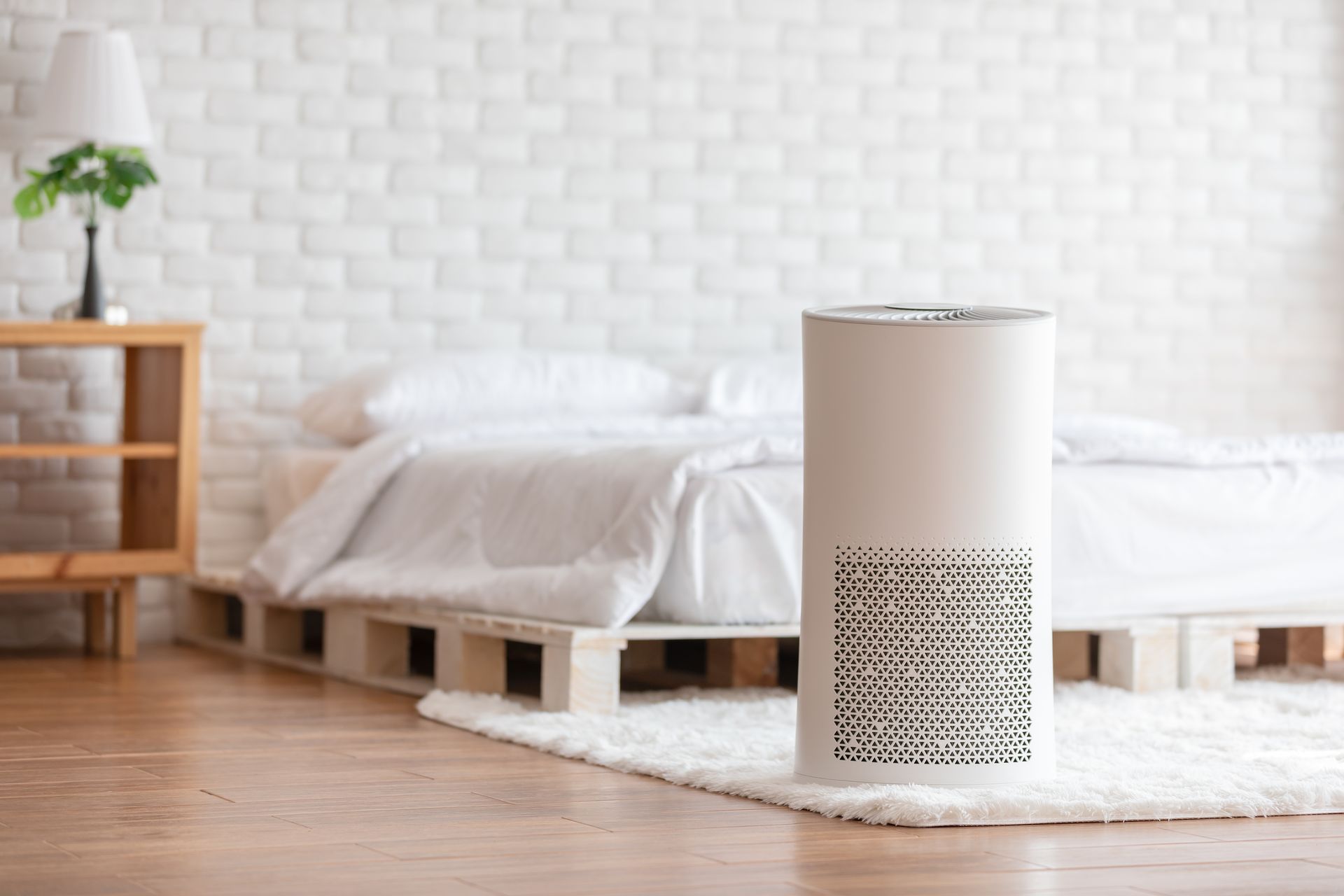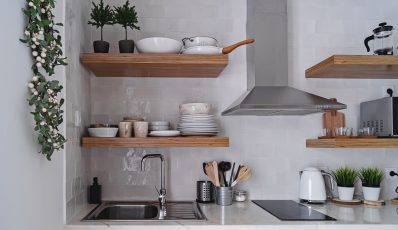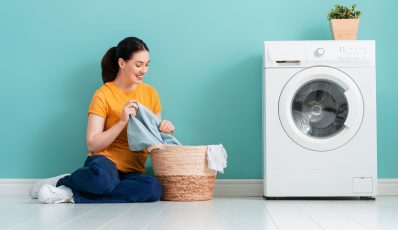The quality of air indoors has a huge impact on your health and well-being. Smog, pollen, dust, exhaust fumes - each one can be harmful. Read on and find out which air purifier will get rid of these pollutants. What should you pay attention to and what types of purifiers can you choose from?

The quality of air indoors has a huge impact on your health and well-being. Smog, pollen, dust, exhaust fumes – each one can be harmful. Read on and find out which air purifier will get rid of these pollutants. What should you pay attention to and what types of purifiers can you choose from?
What is air purification?
Let’s start off by having a look at what air purification actually is. The entire process is designed to capture any pollutants in the air of the room in which you use the purifier. These could be odours, dust, pollen, hair, microbes and mould spores. You can also clean the air of smog, catching PM10 and PM2.5 particles.
Air purifiers have two main elements – a fan and a filter. The first one forces air movement, so that it is sucked inside the device. It then passes through a filter that traps impurities. As a result, the device releases air that is free of volatile particles. The level of effectiveness may vary depending on the chosen model. Read on and find out more about which filters can get rid of viruses and which air purifier is best for allergy sufferers.
What should you look for in air purifiers? Which aspects should you pay attention to?
Like any other electrical device, different air purifiers have different technical parameters, which you should keep in mind when choosing the best air purifier for your needs, to avoid buying a device that is not efficient enough in your case.
How efficient are air purifiers?
When we talk about air purifier efficiency, we mean the amount of air (in cubic metres) that it can filter per hour. It is generally assumed that working at maximum intensity, the optimal value is three times the volume of the room.
So if you are looking for a home air purifier that will be moved from room to room frequently, you should measure the largest room and multiply its size by three. This way you will choose an air purifier that suits your needs.
What air filters do they use?
How effective an air purifier is depends on the filters that catch and eliminate unwanted particles. Read on to learn more about how these filters work. Bear in mind, however, that not all filters eliminate viruses or remove unpleasant odours. Therefore, before buying a purifier, determine exactly what type of pollutants you want it to get rid of.
How noisy are air purifiers?
The noise emission of an air purifier directly impacts the comfort of use for everyone in the same room. If it is too loud, this could distract you during work or prevent you from falling asleep at night. During the day, noise emissions should not exceed 35 dB, while at night they should not exceed 25 dB. Luckily, many air purifiers have special modes that make them work more quietly during the night.
Additional features of air purifiers
Many models, apart from the basic function of air purification, also have additional features. Some models come with a humidifier to ensure an optimal level of humidity. Other models come with a dehumidification function, making the air less stuffy in your home.
Then there are air purifiers with ionisers, which are used to keep a proper balance of cations and anions, helping you avoid drowsiness and enhance your wellbeing. In addition, negative ions generated by a purifier can help in getting rid of volatile microbes and mould spores.
Versions with a built-in ozone generator are also available, and produce ozone, i.e. three-molecular oxygen with a strong biocidal effect. They are used to get rid of bacteria, viruses, fungi, and remove unpleasant odours. Air purifiers with an ozone generation function are usually intended for commercial use, e.g. by cleaning companies.
Operating costs of air purifiers
Over time, you should replace the filters with new ones to make sure the purifier works efficiently. Therefore, check beforehand if replacement filters are easily available, in order to avoid high costs or unnecessary stress later on.
-
Air Purifier – 50 m²
-
Air Purifier – 16 m² 109.00 GBP
-
Air Purifier – 10 m² 85.00 GBP
-
Humidifier – 4.5 L – 3 modes
Types of air purifier filters
The filter is the most important element of an air purifier. Without it an air purifier would be completely useless. However, there is no such things as a universal air filter for a house, apartment or office. You will find several types of filter on the market with a different level of effectiveness.
HEPA Air Purifier Filters: Utilize fibrous material to trap particles larger than 0.3 µm. Comes in types like H12 (99.5% efficiency) and H13 (99.97% efficiency), removing allergens, dust, and bacteria.
Activated Carbon Filters: Known for their absorbing qualities, ideal for removing volatile organic compounds and odors, including smoke and heavy metal ions.
Ion Filters: Produce negative ions to bind and neutralize microbes, spores, and allergens, effective against viruses and small contaminants.
Air Water Filters: Capture bacteria and add moisture to air, but require frequent replacement to prevent microbial growth.
For example, this room dehumidifier is suitable for a room size of 15 m.
This 2-in-1 dehumidifier with cleaning function effectively prevents mould and removes unpleasant odours.
Air purifiers – with or without a humidifier? Which purifier should you choose?
You will come across various models of air purifiers. Which air purifier you should choose depends largely on your needs. Each have features and technical specifications intended for different purposes. So which model will best meet your needs?
Air purifiers for home use
Although this may come as a surprise, you will face more harmful substances at home than outside. In addition to dust, these can include pollen from plants, animal fur, mould spores or cigarette smoke. And don’t forget about smog, which is present mainly in the autumn and winter season.
When choosing an air purifier for home use, first of all check how efficient it is. We already mentioned that the optimal amount of filtered air per hour is three times the volume of the room.
In the case of filters, an air purifier with a HEPA filter will be sufficient, as it will retain most allergens as well as the PM10 and PM2.5 particles found in smog. A carbon filter that eliminates unpleasant odours will be a good addition. The level of noise emissions is also important. After all, you want to relax in peace and quiet at home, without unnecessary noises disturbing you in the background.
A moisture meter is also a handy tool that is used to determine the level of moisture in ceilings, walls, cellars, wood, carpets. This moisture meter 7-10% from Steinberg Systems makes it easy for craftsmen, plumbers, roofers or private individuals to perform measurements. With this 2 x 2.3m long and flexible drain snake from MSW can easily unclog even heavily clogged toilets, drain pipes, and the pipe systems of sinks and bathtubs. If you need an extra long drain snake, then you can choose this 4 x 2.3m long drain snake.
Air purifiers for office use
An office, just like a house or apartment, is also exposed to the presence of various allergens or smog. In addition, there are also other threats to your health or well-being, such as bacteria and viruses transmitted by your co-workers. This is especially the case if you spend many hours in a closed room with someone who is ill.
Offices usually use various electronic devices, such as computers, monitors, printers, etc., which can negatively affect the cation-anion balance and, as a result, affect your productivity. With this in mind, which air purifier should you choose for the office?
Models equipped with an ioniser will be best in this case. They should effectively neutralise pathogenic microbes and allergens, and restore the balance between positive and negative ions.
Which air purifier should be used by allergy sufferers?
Allergy sufferers are particularly exposed to volatile pollutants in the air. Plant pollen, dust or animal fur can make them cough, cause eye irritation and a runny nose, and even lead to swelling. So, which air purifier will be best in this case?
Multi-stage air purifiers will be best for users suffering from allergies. The more stages the better. Of course, HEPA and carbon filters are also important. Purifiers with an ioniser are also worth considering. An air humidifier is also a good choice in this case, as more moisture in the air will help prevent further irritating the throat and respiratory tract.
Air purifiers for small children
Exposure to harmful substances can be much worse in the case of small children. Therefore, cleaning the air from smog is always a good idea. Suspended particles (PM10 and PM2.5) can contribute to the development of asthma as well as other, much more serious respiratory diseases. An air purifier with a HEPA filter is therefore a brilliant idea for using in your child’s room.
In addition to proper air filtering, you should also make sure it has an appropriate level of humidity, making it easier to breathe and improving the comfort of your child’s sleep. This is especially important when it comes to heating and air conditioning, which often dries the air. An air purifier with a humidifier will therefore work well in such situations.
In addition to these features, also check the noise level, because apart from ensuring purer air it should also not be too loud.
-
Ozone Generator – 600 mg/h – 5 filters – UV light – 50 W
-
Ozone Generator – 600 mg/h – 3 filters – 27 W
109.00 GBP69.00 GBP -
Ozone Generator – 500 – 10,000 mg/hr – 95 W 109.00 GBP
-
Ozone Generator – 10,000 mg/h – 102 W
89.00 GBP79.00 GBP
Which air purifier should you choose – summary
Air purifiers for both home and office use are extremely useful when it comes to looking after your general wellbeing. Choosing the right equipment depends on your needs. Remember, however, that the parameters of the air purifier, as well as the type of filters and intended use, play a large role in which purifier you should choose. We hope that after reading this article you will be able to choose the right air purifier for your needs.
Are you looking for a way to stay cool on hot summer days? Find out the difference between an air conditioner and an air cooler. You will find out more about this topic in our next article.






Share